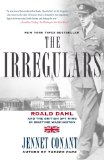Summary | Excerpt | Reviews | Beyond the Book | Readalikes | Genres & Themes | Author Bio

Roald Dahl and the British Spy Ring in Wartime Washington
by Jennet Conant
Dahl knew almost nothing of Stephenson or his covert operation, only that intelligence work promised another chance to serve his country and rout the enemy, and his unquestioning readiness to do so was underscored by his recent disappointing stint as a diplomat. Although the BSC's charter was ostensibly concerned with the protection of British shipping and its vital cargoes, he would have guessed that it extended far beyond that -- to include everything from small-scale sabotage and political subversion to all manner of devious activities that His Majesty's Government would prefer not to acknowledge. The British propaganda machine, in the form of the Ministry of Information, confined itself to "white," or straight, propaganda permitted in neutral or friendly countries. The BSC specialized in "black," or secret propaganda -- in other words, the kind of work you did not want to get caught doing. However dodgy it sounded, if it meant that he could stay in America and make some contribution to the war effort, he wanted in. After making some discreet inquiries, Dahl quietly let it be known that he was interested in being reassigned to the intelligence service.
Before long he received word through an intermediary that his name was not unknown to them and that certain people might be interested in any information he could pass their way. "I had been contacted by one of Bill's [Stephenson] many chaps he had floating around, rather like wisps," recalled Dahl. "You never really realized they were working for him, you thought they were working for someone else, and doing another perfectly different job." While there is no record of precisely what Dahl was told, Bickham Sweet-Escott, another fresh-faced young Englishman who had been recruited by the BSC and was working in Washington when Dahl appeared on the scene, recalled that the intelligence operative who first approached him did not pull any punches. "For security reasons I can't tell you what sort of a job it would be," the agent had told him. "All I can say is that if you join us, you mustn't be afraid of forgery, and you mustn't be afraid of murder." Dahl's contact was probably similarly vague, assuring him that the skullduggery was a matter of routine and that security considerations prohibited him from saying more. In the meantime, Dahl was told he had better stay in touch.
This was the usual drill. Desperately shorthanded, the BSC recruited brains and talent where it could find them, often making only a cursory background check. They brought in friends, family members, and personable colleagues like a club voting in new members, the only qualifications being evidence of a certain confidence and imagination and the assumption of shared values. It was not easy rounding up likely candidates, as by then all the best men had already been snapped up by the older and more respectable departments. The BSC could hardly advertise their requirements, and the pressure to hire people on the spot forced them to spread a wider net than was always advisable. "This meant that recruiting could take place only by personal recommendation," Sweet-Escott explained in his wartime memoir. "In effect you were compelled to put forward the names of your own friends if you happened to know they were not usefully occupied. It was largely a matter of chance whether you got the right man for the job."
Once when they were having a hard time finding secretaries, Sweet-Escott could think of no one to recommend but his sister, Lutie, who happened to know shorthand. Just one word to the wise, and "within a week she was on her way to Cairo via the Cape and the Belgian Congo."
With his reckless sense of humor and general air of insubordination, Dahl may have been mentioned to someone on high as having the makings of an ideal informant, if for no other reason than no one so badly behaved would ever be suspected of working for British intelligence. Any one of a number of people clustered around the embassy at the time could have put his name in the hat. If there was one man who might have taken a particular interest in the enterprising airman, it was Reginald "Rex" Benson, who, in addition to his duties as military attaché and senior adviser to the ambassador, was involved in the highest levels of British security. He certainly would have taken note of Dahl's close friendship with Marsh, and the proximity to the vice president and other key cabinet figures it afforded, and might have thought it worth a try to see if the pilot could be turned into a "voluntary informer," the preferred term for spy.
Copyright © 2008 by Jennet Conant
If you want to build a ship, don't drum up people... but rather teach them to long for the endless immensity of the...
Click Here to find out who said this, as well as discovering other famous literary quotes!
Your guide toexceptional books
BookBrowse seeks out and recommends the best in contemporary fiction and nonfiction—books that not only engage and entertain but also deepen our understanding of ourselves and the world around us.